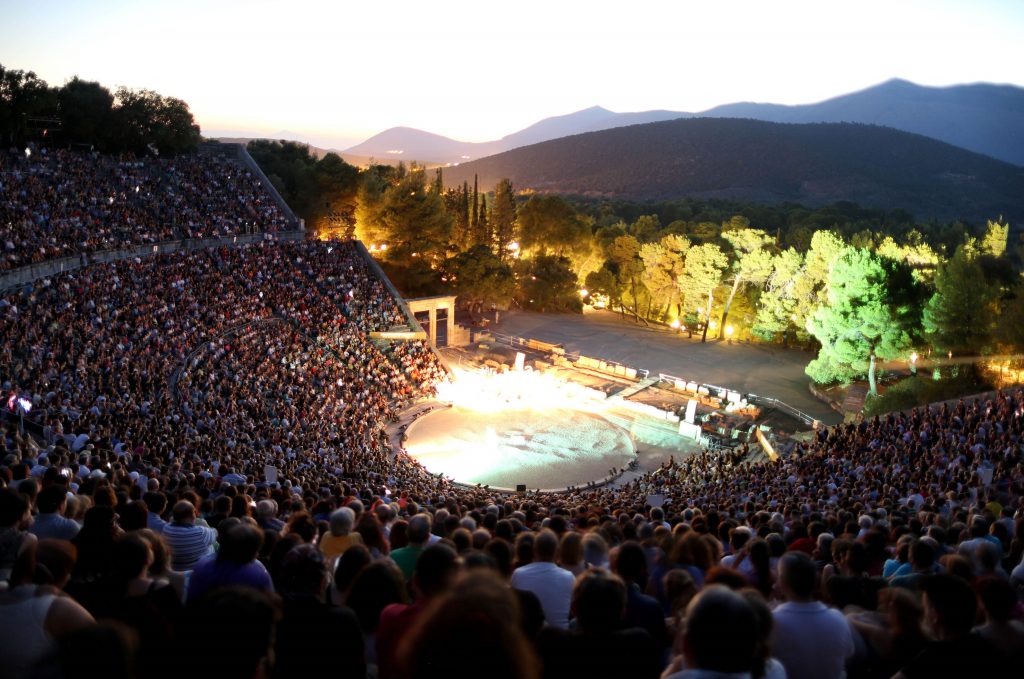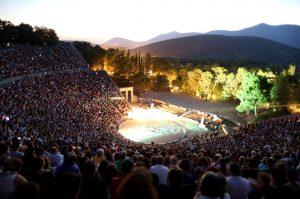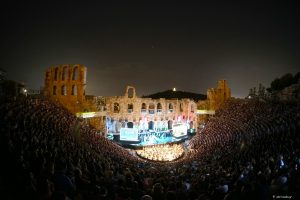The Athens Epidaurus Festival, a cornerstone of the Greek summer and the epitome of high-quality culture, kicked off on June 1 with Giacomo Puccini’s Tosca at the iconic Odeon of Herodes Atticus in Athens, however, one of its most distinctive annual venues, the Ancient Epidaurus Theater, launches its season this weekend and it’s set to host a series of timeless ancient Greek dramas.
In just about a two-hour ride from Athens, visitors can enjoy this year’s productions that include ancient Greek plays by Aeschylus, Euripides, and Aristophanes. These performances are brought to life through the collaboration of a talented Greek cast as well as internationally acclaimed foreign and Greek directors. To ensure accessibility for foreign visitors, all performances will feature English subtitles.
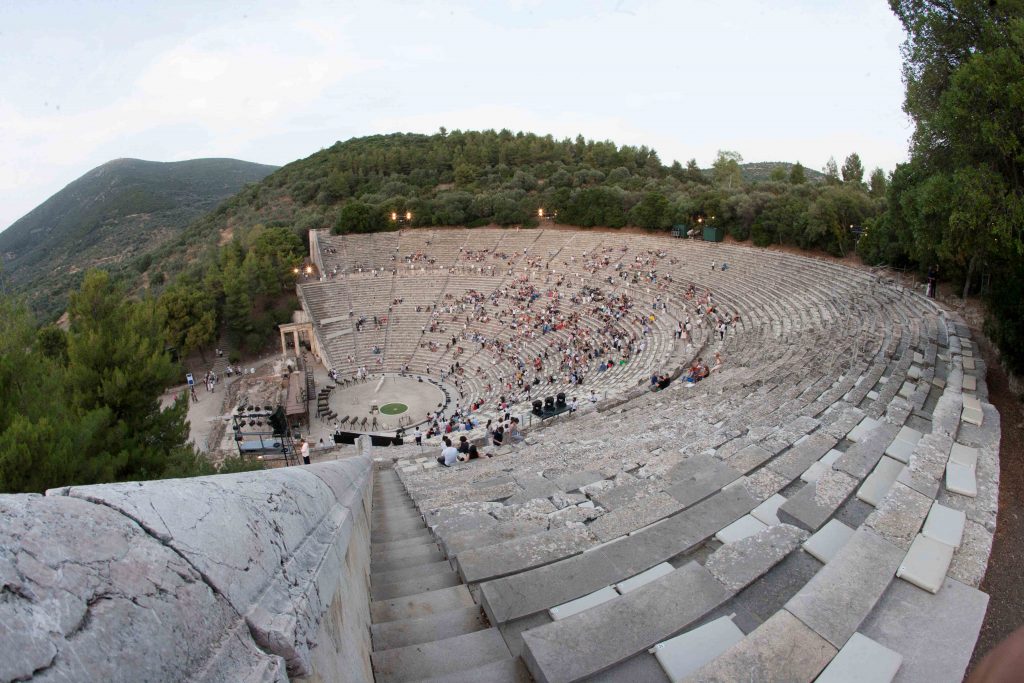
A panoramic view of the ancient Epidaurus Theater, on June 25, 2021.
2024 Performances at the Ancient Epidaurus Theater
‘Iphigenia in Aulis’ by Euripides
July 5 & 6 at 21:00
Internationally acclaimed director Timofey Kulyabin returns to the Athens Epidaurus Festival, which introduced him to the Greek audience with the masterful Three Sisters (2018), a complete rendition of Chekov’s play in sign language. Worldwide appreciated for his exceptional poetic perspective, the Germany-based director will be opening this year’s performances at the Ancient Epidaurus Theater with the Festival’s international production of Iphigenia in Aulis by Euripides.
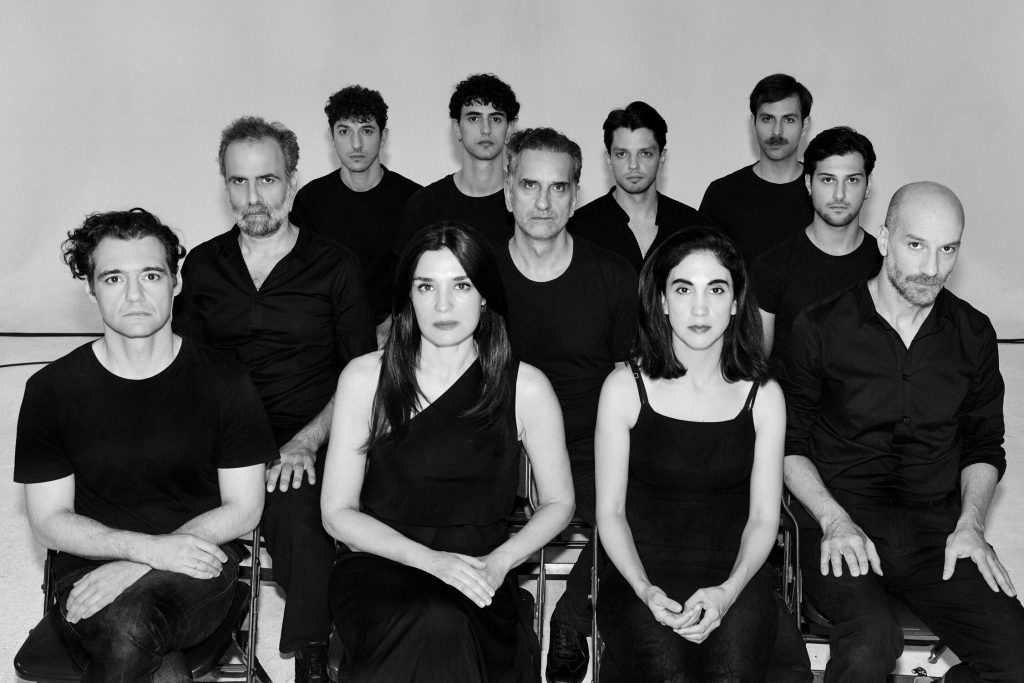
Prominent Greek actors and actresses are set to bring this stellar artistic project to life. Iphigenia in Aulis will have its world premiere at the Epidaurus Theater. Designed exclusively for the Argolic Epidaurus theatre, this long-awaited production ingeniously brings together a foreign director with Greek performers once again, further consolidating the Festival’s international and extroverted character that has been consciously pursued over the past years.
The performance features English and Greek surtitles. Tickets can be found here.
‘Oresteia’ by Aeschylus
July 12 & 13 at 21:00
For the first time, the National Theatre of Greece collaborates with the internationally acclaimed Greek director and teacher Theodoros Terzopoulos, who will be directing Aeschylus’ Oresteia, the only surviving trilogy of ancient drama and the last surviving work of the author (created only two years prior to his death), in a single performance.
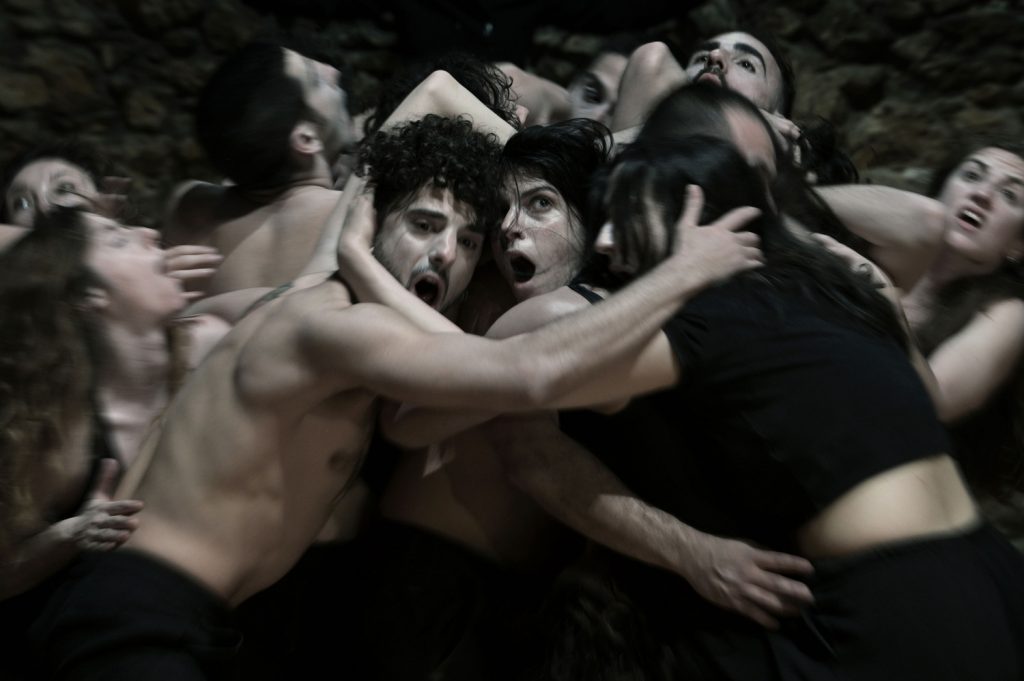
Oresteia was introduced in Athens at the City Dionysia (En Astei Dionysia) in 458 BC, a year of high tension between the proponents of Oligarchy and those of Democracy, reflecting the political, historical, and social conflicts, and the violent upheavals of the time.
The author draws his inspiration from the myth of the Atreidae (Agamemnon and Menelaus, descendants of Atreus, king of Mycenae) and the terrible curse cast upon their house. After ten years of war, the Palace of Mycenae is about to welcome its king, Agamemnon, as the triumphant general of all Greeks. Yet his arrival from Troy also means his death at the hands of his wife Clytemnestra, aided by Aegisthus. In Choephori (The Libation Bearers), the return of Orestes brings the longed-for revenge for Electra. The Chorus rejoices at the royal house’s redemption, and Orestes sets out, as a suppliant, to seek Apollo’s protection at Delphi, while the Erinyes (Furies) come after him. Eumenides is based on the creative retelling of certain Attic cult myths about Orestes’ flight to Athens and his trial by the gods of Olympus. Aeschylus’ plot is further enriched by the establishment of the Areios Pagos on Athena’s initiative and the court’s involvement in breaking the curse. Balance and reconciliation then come to close a cycle of blood and vengeance.
A work of astonishing maturity, integral aesthetics, intellectual depth, and a multitude of philosophical inquiries; a work that expands the boundaries of art and boldly defends a democratic constitution.
To date, Oresteia has been staged by the National Theatre of Greece at the Epidaurus Theater five times: in 1954 and 1959, directed by Dimitris Rontiris; in 1972, directed by Takis Mouzenidis; in 2001, directed by Yannis Kokkos; and in 2019 by three directors, Io Voulgaraki, Lilly Meleme, and Georgia Mavragani, each of whom undertook a tragedy in their first production at the Epidaurus Theater.
The performance features English and Greek surtitles. Tickets can be found here.
‘Plutus (Wealth)’ by Aristophanes at Epidaurus Theater
July 19 & 20 at 21:00
We are in 388 BC. The Peloponnesian War has ended, leaving the Athenians crushed and defeated, marking the end of Athenian hegemony. The honest Chremylus, a poor Athenian peasant and Aristophanes’ alter ego, is experiencing this new reality in a traumatic way: social values, ideas, and morals have fallen away.

The lack of resources and social justice, as well as the fear of impoverishment, terrify this romantic utopian, especially concerning his child’s future. He resorts to the Oracle of Delphi, posing the agonizing question: “What can I do to ensure a secure future for my child?” The oracle tells him to take care of the first helpless person he meets on his way. This is none other than the god Plutus, who generously gives away gold, money, and all material goods Chremylus and society have dreamt of! They are all rich now! Their dream has come true. But deep down, this dream turns out to be a test: in the absence of social cohesion and solidarity, self-awareness, and social conscience, how can the common good be served?
Almost 2,500 years later, the ‘Aristophanic question’ remains relevant. Giannis Kakleas, who, in addition to directing, is also the translator of the National Theatre of Northern Greece’s production, notes: “Our poet, in his own uniquely satirical manner, shows us a way of managing material goods, but always with the interests of the Polis in mind – a Polis with just, honest, and virtuous citizens. Is this utopian? Possibly. Aristophanes, however, reserves the right to dream!”
Manos Vakousis, recently awarded the Karolos Koun Grand Prize for Theatre, will be portraying Chremylus. The cast is joined by Alexandra Palaiologou. The musical part of the performance will feature the “Xatzifrageta” band and Greek singer-songwriter Nalyssa Green.
The performance features English and Greek surtitles. Tickets can be found here.
‘Hecuba, not Hecuba’, Comédie-Française – Tiago Rodrigues
July 26 & 27 at 21:00
After the triumphant reception of Electra / Orestes directed by Ivo van Hove in 2019, the leading company of Comédie-Française returns to Epidaurus, this time with the much-talked-about Portuguese director Tiago Rodrigues, the new director of the Avignon Festival.
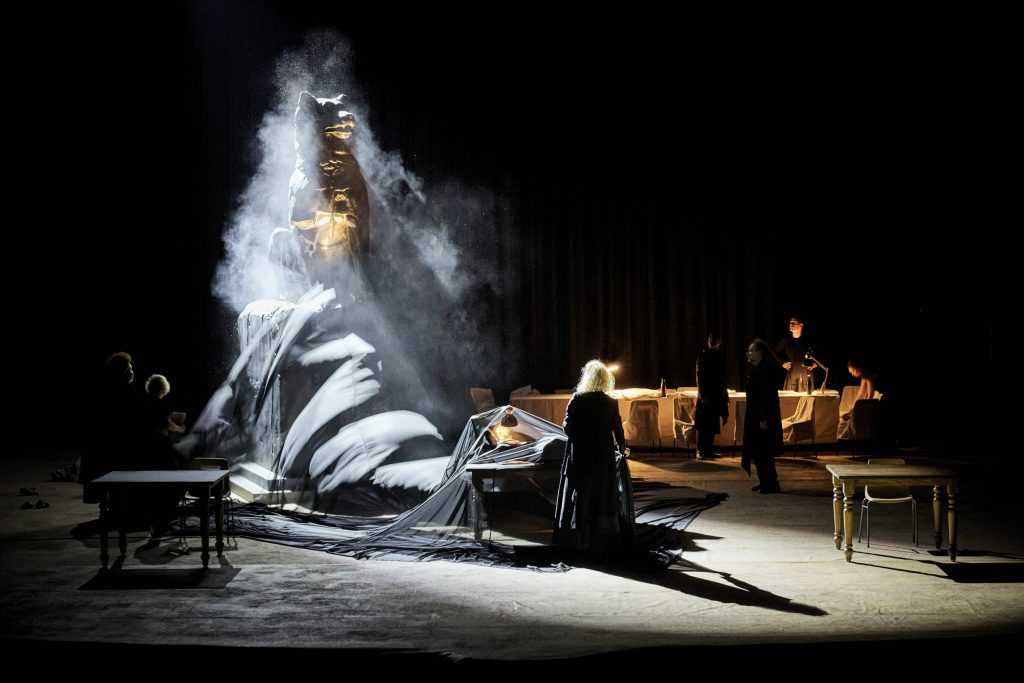
©Christophe Raynaud de Lage
In his first collaboration with Comédie-Française, Tiago Rodrigues takes on the story of Hecuba. Adjusting it in his ‘head-on’ idiom, he intertwines an ancient human being’s drama with that of a modern-day heroine, always on the same ageless canvas – in particular, a Trojan woman’s and a present-day actress and mother’s. Tiago Rodrigues often says that his writing is not about the theatre but the actresses and actors that make up the theatrical play. Here, an actress rehearses Euripides’ Hecuba as she holds the role of Priam’s widow. After the defeat of Troy, Hecuba has lost everything: her husband, her throne, her freedom, and, most tragically, almost all her children – she is a woman seeking justice.
The tragic myth nonetheless meets the actress’ real life in a gut-wrenching way. Her autistic teenage son suffers abuse at the hands of the staff at the institution he is committed to and she trusted. While the parties responsible try to cover up the case, she goes public. The rehearsals are ambiguously interjected with the judicial investigation.
Within an idiosyncratic, borderline context, the two worlds are juxtaposed in a harrowing and shattering concoction of myth and reality, theatre and justice.
The performance will be presented in Epidaurus right after its premiere in July during the Avignon Festival and features Greek and English surtitles. Tickets can be found here.
‘Bacchae’ by Euripides
August 2 & 3 at 21:00
Euripides’ Bacchae – the tragedy of Greece, of rulers and of people, according to Jan Kott – was written in the third decade of the Peloponnesian War when History had already run rampant. It recounts the arrival of Dionysus in Thebes. Euripides composed it during his stay in Macedonia, where he was introduced to the Dionysian cult. When the god Dionysus arrives in Thebes, King Pentheus refuses to acknowledge his first cousin as a god and by his power makes the spread of the new cult illegal. His defiance arouses the wrath of Dionysus who, through a tragic reversal between the persecutor and the persecuted, leads Pentheus to annihilation by his own mother.
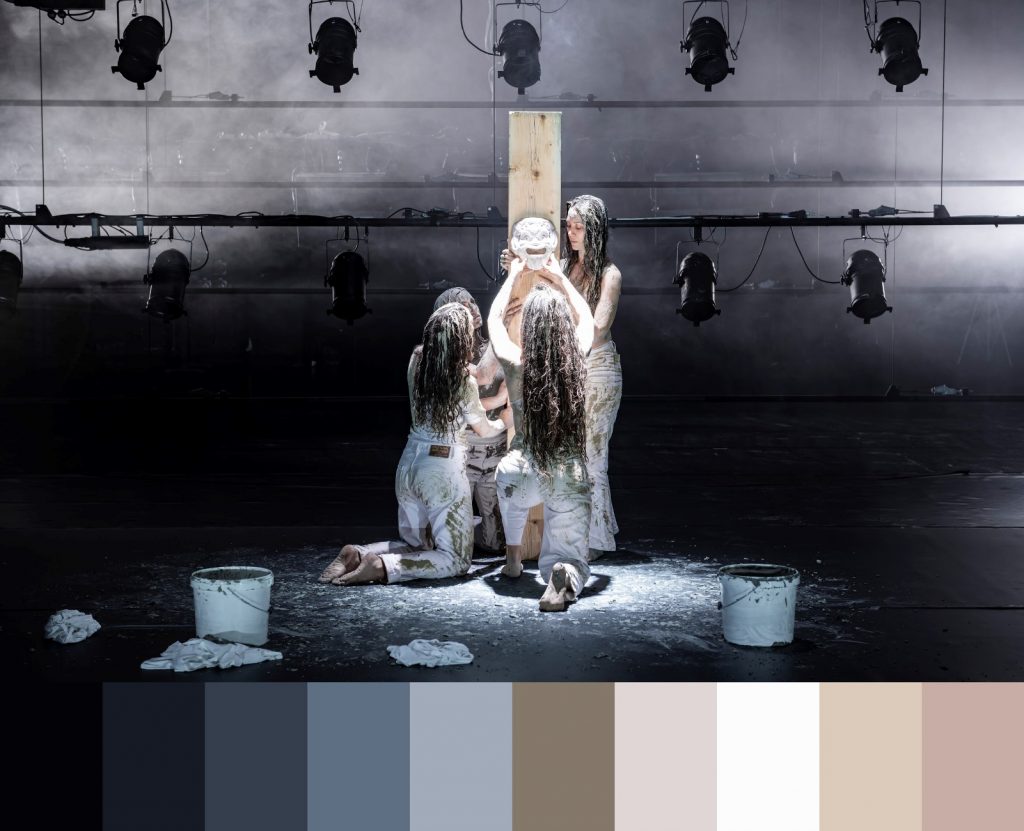
© Elina Giounanli
The work is marked by strict consistency of form and enormous inner strength, while at the same time revealing the poet’s keen interest in mysticism and ecstasy. The tragedy’s central dramatic themes are the possibilities of the soul, human virtue, self-consciousness, prudence, and fallacy, the rational and the irrational, all of which emerge from the antithesis between man and God, the same antithesis from which the drama’s tragic conflict arises.
Bacchae is a National Theater of Greece Production directed by Thanos Papakonstantinou. It features Greek and English surtitles. More information and tickets can be found here.
‘Birds’ by Aristophanes
August 9 & 10 at 21:00
In Birds, Aristophanes tells the story of how two Athenians, Pisthetaerus and Euelpides, make the decision to leave the world of men in search of a city without pettiness and corruption, where one can live in peace and justice. Together with the Birds, they establish a state in the ether and build a wall between men and the gods.

The staging places the play in a pre-tragic environment, approaching it as a primal ritual. And as with any ritual, a troupe brings the myth to life experientially. The two protagonists ask, allegorically, to be ‘emptied’ of all other human qualities and ‘inhabited’, sometimes voluptuously and sometimes furiously, by the bestial drive of the birds in a performance-concert. Backed by the explosiveness of music and movement, director Aris Biniaris creates a contemporary satire, dragging us into an electrifying ‘chant’ that sheds blinding light on the critical issues of the city led at all times by the Aristophanic work.
The performance features Greek and English surtitles. Tickets can be found here.
‘The Suppliants’ by Aeschylus
August 23 & 24 at 21:00
Sixty years after the play’s first staging at the Ancient Theatre of Epidaurus, the Karolos Koun Art Theatre, in collaboration with the Neos Kosmos Theatre, presents Aeschylus’ The Suppliants directed by Marianna Calbari: a poetic and deeply political play at the center of modern concerns about the concept of asylum in a democratic society – especially when those who are persecuted are women.
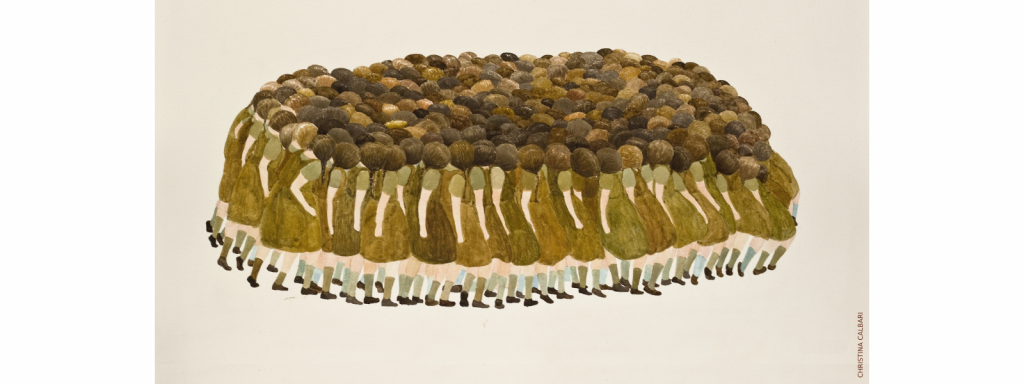
The play (the first and only surviving play from Aeschylus’ Danaid Tetralogy) features a collective female character: the Chorus of the fifty Danaïdes who, together with their father Danaus, abandon Libya and Egypt and seek asylum in the city of Argos. Like their ancestress Io, whom Hera mercilessly persecuted by sending her a bothersome gadfly, the oestrus, to torment her. The Danaïdes now struggle to flee a forced marriage to the fifty sons of Aegyptus. The myth raises the issue of female identity and place in society while recounting the chronicle of the settlement and predominance of the Greeks in the land of the Pelasgians, the so-called pre-Greeks.
The Danaid Suppliants speak of the needs that lead people to uproot themselves from their land, the fierce fate of the refugee, the value of justice, and the principles of democracy. Above all, they speak of the Woman’s struggle against the Man who seeks to force himself on her.
The performance redemptively unites the voices of ancient heroines with those of today’s heroines through an awe-inspiring chorus of fifty young women, led by Lena Papaligoura and Loukia Michalopoulou in the roles of Hypermnestra and Amymone, respectively. The CHÓRES female vocal ensemble, created and led by Marina Satti, will also be part of the chorus, with the latter performing as a soloist.
Acclaimed actress and Former Minister of Culture and Sports of Greece, Lydia Koniordou, portrays the male role of Pelasgus.
The performance features English and Greek surtitles. More info and tickets can be found here.
